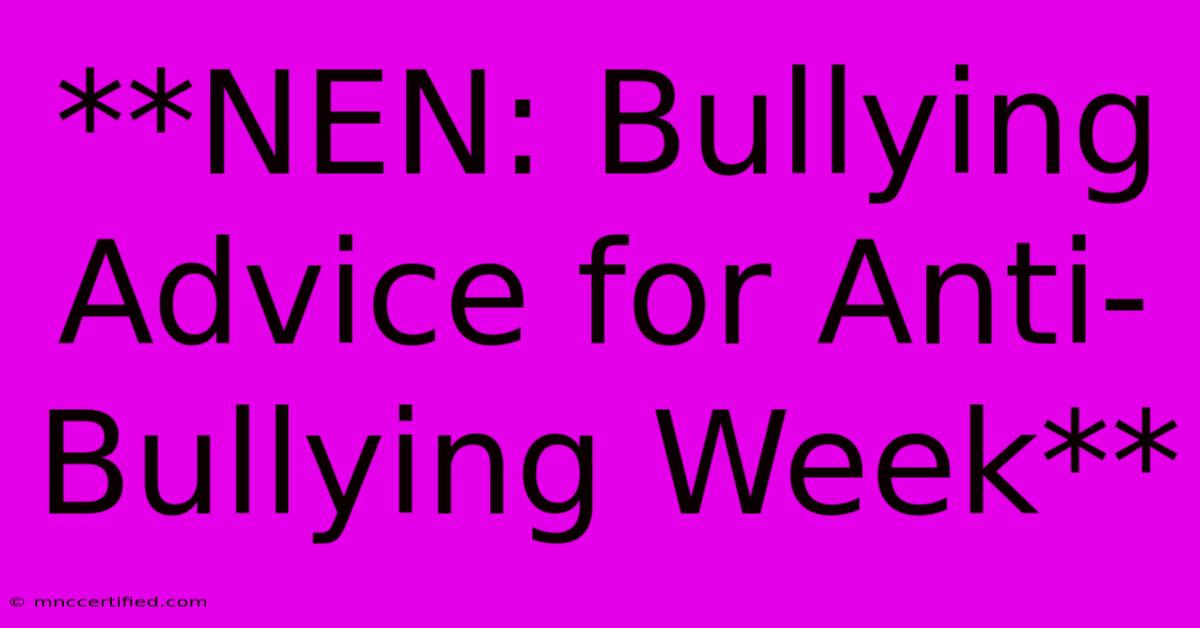**NEN: Bullying Advice For Anti-Bullying Week**

Table of Contents
NEN: Bullying Advice for Anti-Bullying Week
Anti-Bullying Week is an important time to raise awareness about bullying and provide support to those who are affected by it. The National Education Network (NEN) is committed to helping create a safe and inclusive learning environment for all students. This year, we're focusing on providing practical advice and resources to help you navigate the complexities of bullying.
What is Bullying?
Bullying is any behavior that is intended to hurt, intimidate, or humiliate another person. It can take many forms, including:
- Physical bullying: hitting, kicking, pushing, or damaging someone's property
- Verbal bullying: name-calling, teasing, threats, or insults
- Social bullying: spreading rumors, excluding someone from a group, or embarrassing someone publicly
- Cyberbullying: using electronic communication to bully someone, such as sending mean text messages, posting hurtful comments online, or sharing embarrassing photos or videos
NEN's Advice for Students:
If you are being bullied:
- Tell someone you trust: Talk to a parent, teacher, counselor, or another adult you feel comfortable confiding in.
- Don't blame yourself: Bullying is never your fault. It's important to remember that you deserve to be treated with respect.
- Document the bullying: Keep a record of the bullying incidents, including dates, times, and what happened. This can be helpful if you need to report the bullying to a school official.
- Stay safe: If you feel threatened or unsafe, remove yourself from the situation and report it to an adult immediately.
- Don't retaliate: Responding to bullying with more bullying only makes the situation worse.
If you see someone else being bullied:
- Speak up: Don't be afraid to intervene, even if it's just to tell the bully to stop.
- Support the victim: Let the person know that you're there for them and that you believe them.
- Report the bullying: Tell a trusted adult about what you saw.
NEN's Advice for Parents:
- Talk to your child about bullying: Encourage open communication and let them know they can come to you with any problems.
- Be aware of the signs of bullying: Look out for changes in your child's behavior, such as becoming withdrawn, anxious, or having trouble sleeping.
- Work with the school: If your child is being bullied, contact the school and work with them to create a safety plan.
- Educate yourself about bullying: There are many resources available online and in your community that can help you learn more about bullying and how to prevent it.
NEN's Advice for Teachers:
- Create a positive and inclusive classroom environment: Promote respect, empathy, and kindness.
- Develop clear rules and consequences for bullying behavior: Make sure students understand what is considered bullying and the consequences of engaging in it.
- Report all incidents of bullying: Take every report of bullying seriously and investigate it thoroughly.
- Provide support to victims of bullying: Offer guidance and resources to students who have been bullied.
Conclusion
Bullying is a serious issue that can have a lasting impact on victims. By working together, we can create a safer and more supportive environment for all students.
This Anti-Bullying Week, let's all commit to promoting kindness, understanding, and respect.
Keywords: Anti-Bullying Week, bullying, NEN, National Education Network, cyberbullying, social bullying, verbal bullying, physical bullying, advice, students, parents, teachers, support, resources, safety, respect, kindness, empathy, inclusion

Thank you for visiting our website wich cover about **NEN: Bullying Advice For Anti-Bullying Week** . We hope the information provided has been useful to you. Feel free to contact us if you have any questions or need further assistance. See you next time and dont miss to bookmark.
Featured Posts
-
Homeowners Insurance And Wood Stoves
Nov 11, 2024
-
5 Key Points Lions Vs Texans Game
Nov 11, 2024
-
Car Accident No License Or Insurance
Nov 11, 2024
-
Taylor Swift At Nfl Game Chiefs Vs Broncos
Nov 11, 2024
-
Cotten Coverage Insurance Agency Inc
Nov 11, 2024